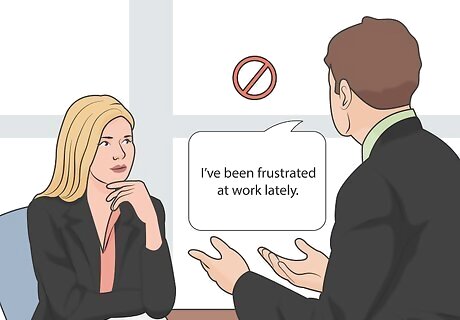
views
Processing Your Feelings

Let yourself feel disappointed and respond emotionally in a safe place. Once you’re away from your job, allow yourself to get angry, sad, frustrated, resentful, anxious, or whatever other emotion you may be feeling. Take a few hours to be upset rather than trying to minimize your experience or pretend it didn’t happen. If you’re so upset you're unable to continue working, try to take a break. Go for a walk, take a drive, or call a friend, and try to blow off some steam for 15 minutes before going back to finish your workday.

Get to the root of your feelings so you can respond rather than react. Sometimes your surface feelings—especially ones of anger—can threaten to boil over. Take the time to work through your feelings and look at what’s underneath your initial knee-jerk reaction. This can help you understand yourself better, which will make it easier to think about having a calm conversation with your boss. For example, let’s say your boss passed you over for a special work trip, even though you’ve put in a lot of time and effort into the presentation for the trip. Your initial reaction may be anger, confusion, or grief, and you may even be tempted to spout off or quit your job on the spot! Beneath your surface emotions, you may also be feeling undervalued. You may feel that your boss doesn’t appreciate or see the work that you’ve done. You may be wondering if you should have been doing something differently. Work on adding the “because” to your emotions to help you understand them. “I feel hurt because my work is going to be presented by someone else,” or, “I feel angry because I’ve given a lot to the company and don’t feel appreciated.”

Vent to someone you trust before talking to your boss. When you finally talk with your boss, you want to be calm and level-headed; after all, you’re looking to have a conversation that will hopefully better your relationship. Venting to a friend about how you’re angry, confused, or disappointed is a great way to validate your emotions without letting them hurt you professionally. Your friend may have some great advice or be able to give an outsider’s opinion if that’s something you’re open to.

Look at the situation from your boss’s point of view to gain perspective. Try asking yourself what your boss may have been thinking when they made a particular decision. Consider that there may be outside forces, like a budget or new hiring practices, that are affecting company policy. Having a different perspective can help you think through how the conversation with your boss might sound.
Preparing for the Meeting

Schedule an appointment to talk with your boss. Ask your boss to meet with you at a specific time rather than just trying to catch them when they have a few free minutes. Having dedicated time for a conversation will give you both the space you need to speak and listen. Take your boss’s personality and communication preferences and schedule into account. If your boss is always rushing off to pick up their kids in the afternoon, maybe an early morning meeting would work best. Try saying something like, “Hi Kate, do you have time for a meeting this Wednesday? I’d like to follow up with you about my latest performance review.”

Resolve to stay calm and not argue, yell, cry, or accuse. Working through your disappointment and emotions beforehand helps prevent these bursts of emotion, which might make your boss take you less seriously. Remember that you and your boss might have different perspectives on the same situation, but you have to stay calm to communicate effectively. You can’t control your boss’ response, but you can make sure you communicate clearly and ask for what you need.

Practice what you want to say beforehand so you can speak concisely. Remember, your boss’s time is valuable, as is yours. You want to get to the point and keep from meandering or getting overly personal. Try to be as factual and clear as possible and avoid whining, complaining, or comparing. For example, if you’re dealing with a harsh performance review, try saying something like this: “Last week in my performance review, you told me my work hasn’t been up to standard. I was surprised and disappointed to hear this because I hadn’t received any negative feedback on my most recent project. If there is a problem with my work, in the future I’d like to know in the moment so that I can address the issue and be a productive member of our team. Can we talk about ways I can improve so this doesn’t stay an issue?” You may want to try writing down what you plan to say or making bullet points to reference during your meeting. It can be hard to have these kinds of conversations and you may find you forget what you wanted to say at the moment.

Anticipate a positive resolution to enter the conversation with an open mind. If you go into your meeting expecting your boss to shut you down or not listen to you, it may be harder for you to communicate. Instead of obsessing about how the conversation could go wrong, choose to think of how it will go right. If you find yourself playing out horrible ends to your conversation, stop, acknowledge your thoughts, and reframe them. Try thinking something like, “What if everything works out?”
Having a Calm Conversation

Use open body language. Practice keeping a neutral expression. Keep your fists open, your face relaxed, and avoid hunching your shoulders or crossing your arms. Avoid touching your face or playing with your hair, as these movements can communicate insecurity.

Explain clearly the situation that disappointed or frustrated you. Saying something generic like, “I’ve been frustrated at work lately,” isn’t going to help you and your boss have a constructive conversation. Pinpoint what the experience was that made you feel disappointed. For example, say something like, “When I was hired, I was told I would have the opportunity to work from home several days a week. When I’ve tried to implement that practice, I’ve been shut down.”

Tell your boss how that situation made you feel. Express to them the emotion—e.g., anger, confusion, anxiety—and why you felt it. Don’t devolve into the actual emotion; do your best to stay calm. But it’s okay to let your boss know that you were upset or angry or whatever it was you were feeling. You may say something like, “I’m disappointed that I wasn’t chosen to go on the Vancouver trip. I worked hard on that project, so I felt unseen and unappreciated when the announcement was made about who would be going.”

Communicate with your boss about what you need in the future. This is where you get to ask for clarity, give ideas about how to better communicate, or tell your boss how they can help you be a better worker. Your boss can’t read your mind, so you have to ask for what you need. You may say something like, “I need clarification about this part of my job. Can you give me more information about why there has been a delay on this?” Or, “I put in a lot of time on that project and was proud of my work. I understand some adjustments needed to be made, but I also needed to hear that my effort was noticed.”

Let your boss respond in full before you say anything else. Once you’ve said what you needed to say, sit back and wait. When your boss responds, do your best to truly listen. Don’t interrupt them to defend yourself or argue about something. Listen respectfully and hear that they’re saying. Hopefully, your boss responds positively and appreciates that you opened a channel for more genuine conversation. If you need to, answer any questions or ask other ones you may have.

Let the situation go and move forward in your job. Stewing and keeping a record of the ways you feel you’ve been wronged won’t improve your situation and will just make you unhappy at work. After dealing with the conflict and expressing your disappointment, do your best to let it go. If the experiences you’re having with your boss are chronic, you may need to think about whether or not your job is the right fit for you.

Send an email if you need a record of your conversation with your boss. Ideally, you’ll meet with your boss in person. In some situations, though, it may be helpful to have a written record of you expressing concern and disappointment about something that happened at your job. If you do write an email, make sure to be clear, calm, and direct. Remember that your boss won’t be able to read your body language or tone like they would if you were meeting in person. For example, an email about disappointment in getting passed over for a recent job might look something like this: “Ben, I heard that Raquel was offered the new management position earlier this week. I was disappointed to hear the news, especially since we had talked about me taking over that position at my last review. Is there something I should be doing differently to make sure I’m considered for future advancement at the company? I’m looking forward to hearing how I can improve my work and continue to be a valued member of our team. Warmly, Victoria.”



















Comments
0 comment